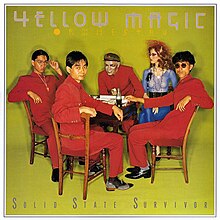Solid State Survivor
| Solid State Survivor | ||||
|---|---|---|---|---|
 |
||||
| Studio album by Yellow Magic Orchestra | ||||
| Released | 25 September 1979 | |||
| Studio | Alfa Studio “A”, Shibaura, Minato, Tokyo | |||
| Genre | Electronic, synthpop | |||
| Length | 32:23 | |||
| Label | Alfa Records | |||
| Producer |
|
|||
| Yellow Magic Orchestra chronology | ||||
|
||||
| Singles from Solid State Survivor | ||||
|
||||
| Professional ratings | |
|---|---|
| Review scores | |
| Source | Rating |
| Allmusic | |
| All Music Guide | |
Solid State Survivor is the second album by Japanese electronic music band Yellow Magic Orchestra, released in 1979. Solid State Survivor was never released in the United States, but many of the songs from this album were compiled for release in the States as the US pressing of ×∞Multiplies (1980), including the tracks "Behind the Mask", "Rydeen", "Day Tripper", and "Technopolis".Solid State Survivor is only one of a handful of YMO albums in which the track titles do not have a Japanese equivalent.
The album was an early example of synthpop, a genre that the band helped pioneer alongside their earlier album Yellow Magic Orchestra (1978), and it also contributed to the development of techno.Solid State Survivor won the Best Album Award at the 22nd Japan Record Awards, and it sold two million records. Several songs from the album have continued to be widely covered and sampled.
Solid State Survivor contains some of Yellow Magic Orchestra's best-known songs, including "Rydeen", which combines Eastern and Western musical styles, in addition to drawing from animal sounds, particularly the rhythms of a running horse. "Rydeen" was often sampled or covered in early chiptune and video game music, including Sega's Super Locomotive (1982),Rabbit Software's Trooper Truck (1983),ZUN's Touhou: Highly Responsive to Prayers (1996), and the Martin Galway soundtracks for Ocean Software's Daley Thompson's Decathlon (1984) and Superior Software's Stryker's Run (1986).
...
Wikipedia
